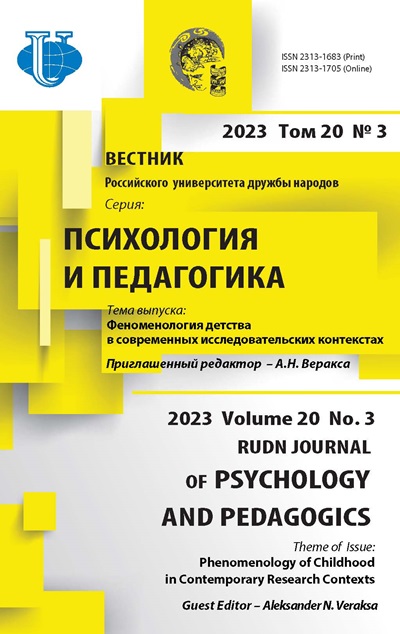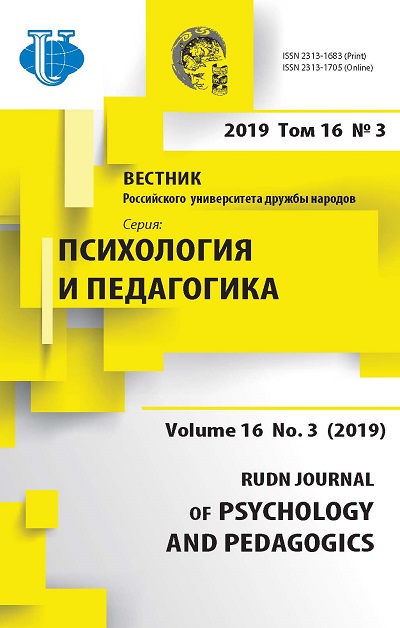Psychodiagnostics of Psychological Readiness of Candidates for Management of Correctional Facilities
- Authors: Bovin B.G1, Fedorova E.M2
-
Affiliations:
- Research Institute of the Federal Penitentiary Service of Russia
- The Russian State University of Justice
- Issue: Vol 16, No 3 (2019)
- Pages: 416-434
- Section: PSYCHODIAGNOSTICS
- URL: https://journals.rudn.ru/psychology-pedagogics/article/view/22138
- DOI: https://doi.org/10.22363/2313-1683-2019-16-3-416-434
Cite item
Full Text
Abstract
The article presents the results of an empirical study conducted by the employees of the Research Institute of the Federal Penitentiary Service. The problems of the psychological selection of the employees enrolled in the reserve for the posts of heads of correctional institutions of the penitentiary system of the North Caucasus Federal District are considered. The sample consisted of 164 employees of corrective services, pre-trial detention centers, medical correctional institutions and correctional institutions in the territorial bodies of the Federal Penitentiary Service of Russia of the North Caucasus Federal District: age - from 25 to 45 years old, gender - male, work experience - from 3 to 10 years. The methods used in the centers of psychodiagnostics of the territorial bodies of the Federal Penitentiary Service of Russia were used in the psychological examination of candidates enlisted in the reserve for promotion, namely, MMPI and an expert survey. As a result of the study, the criteria for psychological readiness for managerial activities and psychological contraindications for holding a managerial position were determined. On the basis of a multiple regression analysis, a socio-psychological model, which determines the level of staff readiness for management activities in correctional institutions of the Penal Enforcement System was also developed. The practical significance of the study lies in the possibility of applying the developed model to the psychodiagnostic examination of candidates and the formation of a reserve for managerial positions.
About the authors
Boris G Bovin
Research Institute of the Federal Penitentiary Service of Russia
Author for correspondence.
Email: bovinbg@yandex.ru
Ph.D. in Psychology, is Leading Researcher
14 Zhitnaya St., Moscow, 119991, Russian FederationEkaterina M Fedorova
The Russian State University of Justice
Email: katifedor@yandex.ru
Master of Psychology, is Advisory Member of the Association of Professional Psychologists and Psychotherapists, Lecturer
69 Novocheryomushkinskaya St., Moscow, 117418, Russian FederationReferences
- Berezin, F.B., Miroshnikov, M.P., & Sokolova, Е.D. (2011). Metodika Mnogostoronnego Issledovaniya Lichnosti. Struktura, Osnovy Interpretacii, Nekotorye Oblasti Primeneniya. Moscow: “Bеrеzin Fеliks Borisovich” Publ. (In Russ.)
- Bovin, B.G. (2018). Psihologicheskaya prigodnost’ k sluzhbe v pravoohranitel’nyh organah. Moscow: Yurlitinform Publ. (In Russ.)
- Bovin, B.G., & Iriskhanov, A.A. (2017). Professionally important qualities of the head of the middle level in the penitentiary system of Russia. Psychology and Law, 7(2), 91–105. https://doi.org/10.17759/psylaw.2017060208. (In Russ.)
- Bovin, B.G., Myagkih, N.I., & Safronov, A.D. (Eds.). (1997). Osnovnye Vidy Deyatel’nosti i Psikhologicheskaya Prigodnost’ k Sluzhbe v Sisteme Organov Vnutrennih Del. Moscow. (In Russ.)
- Byuyul, A., & Cefel, P. (2005). SPSS: Iskusstvo Obrabotki Informacii. Analiz Statisticheskih Dannyh i Vosstanovlenie Skrytyh Zakonomernostej. Saint Petersburg: DiaSoftYUp Publ. (In Russ.)
- Constantine, L. (1993). Work organization: paradigms for project management and organization. Communications of the ACM, 38(10), 35–43. https://doi.org/10.1145/163430.163435
- Cumberland, D.M., Herd, A., Alagaraja, M., & Kerrick, S.A. (2016). Assessment and development of global leadership competencies in the workplace: A review of literature. Advances in Developing Human Ressources, 18(3), 301–317. http://dx.doi.org/10.1177/1523422316645883
- Dahlstrom, W.G., & Wels, G.S. (1960). An MMPI handbook. A Guide to Use in Clinical Practice and Research. Minneapolis: The University of Minnesota Press.
- Debol’skij, M.G. (2004). Psihologicheskoe obespechenie raboty s rezervom kadrov na upravlencheskie dolzhnosti. Teoreticheskie i Prikladnye Problemy Deyatel’nosti UgolovnoIspolnitel’noj Sistemy (рр. 158–168). Moscow. (In Russ.)
- Dixit, O., & Singh, S. (2019). Moderating influence of emotional intelligence on organisational citizenship behaviour and counterproductive work behavior. Journal of Strategic Human Resource Management, 8(1), 26–31.
- Drigas, A., & Papoutsi, C. (2019). Emotional intelligence as an important asset for HR in organizations: leaders and employees. International Journal of Advanced Corporate Learning, 12(1), 58–66. https://doi.org/10.3991/ijac.v12i1.9637
- Goulman, D. (2017). Emocional’nyj Intellekt. Pochemu On Mozhet Znachit’ Bol’she, Chem IQ. Moscow: Mann, Ivanov i Ferber Publ. (In Russ.)
- Guzeva, T.V. (2011). Psychological training of managers as factor of management effectiveness. Psychological-Pedagogical Research, (1). Retrieved from http://psyjournals.ru/psyedu_ru/2011/n1/39943.shtml. (In Russ.)
- Harper, D. (2016). Correctional executives leadership self-efficacy and their perceptions of emotional intelligence. American Journal of Criminal Justice, 41(4), 765–779. https://doi.org/10.1007/s12103-015-9319-1
- Kubyshko, V.L., Kruk, V.M., Noss, I.N., & Borodina, T.I. (2018). Experimental validation of the model approach in professional psychological selection of law enforcement officers. Psychology and Law, 8(3), 34–47. https://doi.org/10.17759/psylaw.2018080303. (In Russ.)
- Liebling, A., & Crewe, B. (2013). Prisons beyond the penology: the shifting moral foundations of prison management. In R. Sporks & J. Simon, The Sage Handbook of Punishment and Society (pр. 283–307). London: Sage. https://doi.org/10.4135/9781446247624.n14
- Lipatov, S.A. (2005). Oprosnik “Shkaly organizacionnyh paradigm” L. Konstantina. Zhurnal Prakticheskogo Psikhologa, (2), 186–198. (In Russ.)
- Ozhiganova, G.V. (2016). Self-regulatory abilities in professional activity. RUDN Journal of Psychology and Pedagogics, (4), 37–46. (In Russ.)
- Rakov, A.M. (2008). Psihologiya Professional’noj Prigodnosti k Sluzhbe v UgolovnoIspolnitel’noj Sisteme Rossii: Ph.D. Thesis Abstract. Ryazan: Akademiya FSIN Rossii. (In Russ.)
- Rakov, A.M. (2010). Professional’nyj psihologicheskij otbor v ugolovno-ispolnitel’noj sisteme Rossii. In Kochenovskie chteniya. Psihologiya i pravo v sovremennoj Rossii. Moscow: MGPPU Publ. Retrieved from http://psyjournals.ru/files/41416/Kochenovskie_chteniya_2010_Rakov.pdf. (In Russ.)
- Shinina, T.V. (2013). Kadrovyj rezerv: sovremennyj oblik problemy i puti ee resheniya. Social’no-Ekonomicheskie i Psihologicheskie Problemy Upravleniya: Conference Proceedings. Moscow: MGPPU Publ. Retrieved from http://psyjournals.ru/social_economical_psychological_/issue/63227.shtml. (In Russ.)
- Sobchik, L.N. (1997). Vvedenie v Psihologiyu Individual’nosti: Teoriya i Praktika Psihodiagnostiki. Moscow: Institut prikladnoj psihologii. (In Russ.)
- Uilan, C.H. (2016). Golaya Statistika. Samaya Interesnaya Kniga o Samoj Skuchnoj Nauke. Moscow: Mann, Ivanov i Ferber Publ. (In Russ.)
















